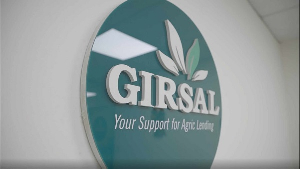 Ghana Incentive-Based Risk Sharing System for Agricultural Lending (GIRSAL)
Ghana Incentive-Based Risk Sharing System for Agricultural Lending (GIRSAL)
The Ghana Incentive-Based Risk Sharing System for Agricultural Lending (GIRSAL) has guaranteed more than GH¢1.2billion since its inception in 2019.
This came to light during the launch of its fifth anniversary under the theme ‘Cultivating Growth: Five Years of Empowering Ghana’s Agriculture Through Innovative Finance and Technical Support’.
GIRSAL, a government-backed initiative aimed at boosting agricultural financing, has facilitated lending to137 agribusinesses during the period through 37 partner financial institutions across the country – chief among them the Agriculture Development Bank (ADB) and Development Bank Ghana (DBG).
“Our mission was clear from the start – to de-risk agricultural lending and unlock the potential of Ghana’s farming sector. Today’s figures are a testament to the success of our approach,” Board Chair-GIRSAL Dr. Yaw Ansu said during the anniversary event.
The organisation’s unique credit guarantee scheme, which covers up to 70 percent of agricultural loans, has successfully de-risked agricultural financing and stimulated a surge in lending to a sector long considered high-risk by traditional financial institutions – and has been described as revolutionary for both lenders and borrowers.
This financial infusion has created or sustained over 2,990 jobs, directly impacting the livelihoods of 67,000 farmers and farm workers across the country.
Perhaps most significantly, GIRSAL’s credit risk guarantee scheme has resulted in some US$25millionofexports earnings, with interest rates reduced by 1 percent to 6 percent. This reduction has translated to savings of GH¢1.34million for agribusinesses, freeing-up capital for reinvestment and growth.
While Greater Accra leads with GH¢422.61million in guaranteed loans, significant funds have flowed to traditionally underserved regions. The Northern Region, for instance, has seen GH¢136.51million of guaranteed loans while Eastern Region has benefitted from GH¢178.67million.
Finance Minister Dr. Mohammed Amin Adam commended GIRSAL’s efforts, highlighting its critical role in supporting government’s broader agenda of boosting agricultural productivity and economic growth.
He remarked: “GIRSAL has transformed the perception of risk in the agricultural sector, which has long hindered access to credit. Through its innovative guarantee system the initiative is unlocking much-needed capital for agribusinesses, fuelling growth, job creation and increased incomes for farmers”.
Bank of Ghana (BoG) Governor Dr. Ernest Addison underscored the role of GIRSAL in stimulating agriculture lending.
Dr. Addison also highlighted some regulatory interventions by the apex bank to stimulate agriculture lending. In 2021, BoG approved a zero-risk weighting for credit exposures covered by GIRSAL’s Credit Guarantee Scheme.
By reducing the capital requirements for financial institutions lending to farmers and agribusinesses, the scheme has encouraged increased lending to the sector. This has led to improved access to finance for farmers, enabling them to invest in better inputs, expand their operations and increase productivity.
As GIRSAL embarks on its next phase, Dr. Addison expressed confidence in its future. “The Bank of Ghana pledges its strong support to GIRSAL as it is anticipated that GIRSAL will continue to drive the policy discourse on agricultural finance and develop innovative solutions which boost productivity and growth in the agricultural sector.”
GIRSAL’s influence is not limited to traditional crops. The organisation has strategically distributed its guaranteed loans across various sub-sectors – with 34 percent allocated to cross-cutting crop initiatives, 22 percent to tree-crops and 20 percent to cereals. This diversification strategy has helped stabilise the agricultural economy against market fluctuations and climate-related risks.
Moreover, GIRSAL’s focus on the entire value chain is evident in its loan distribution: 33.23 percent for inputs, 29.81 percent for production and significant allocations for marketing, processing and aggregation. This holistic approach ensures that every aspect of the agricultural process receives necessary financial support.
The organisation’s commitment to capacity building is equally impressive. Through its Technical & Advisory Services, GIRSAL has trained 700 mid-level staff from financial institutions in agricultural lending risk assessment and management. Additionally, over 700 senior bank executives and board members from 9 financial institutions have been reached through targetted capacity-building sessions.
In a move to bridge the information gap, GIRSAL has developed a web-based Agriculture and Agribusiness Lending Knowledge Portal. This resource hub, covering 33 agricultural commodities, has seen over 6,000 visits since its launch in November 2020 – with active users from 39 institutions.
GIRSAL has also initiated a pilot project using innovative shade-net technology to cultivate Bird Eye chili peppers for export to the European Union. This project, part of GIRSAL’s value chain development initiative, has already set up 3.4 out of 4.5 planned hectares across three trial sites and successfully exported 6.14 metric tonnes.
Minister of Agriculture Bryan Achaempong praised GIRSAL’s role in positioning Ghana as a key player in the global agricultural market.
He noted: “As the world faces increasing agricultural challenges, Ghana is positioning itself as a leader in agricultural innovation and resilience. GIRSAL’s efforts are central to building a more robust, sustainable agricultural sector that can withstand both local and global shocks.”
The minister expressed confidence that GIRSAL’s capacity-building and innovation-focused initiatives will continue to play an instrumental role in the country’s agricultural resilience, especially in the light of recent climate-related challenges such as droughts.